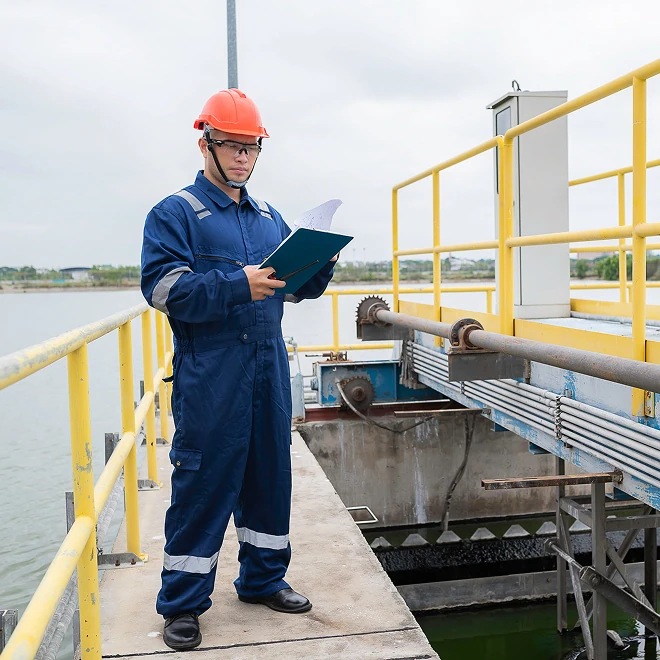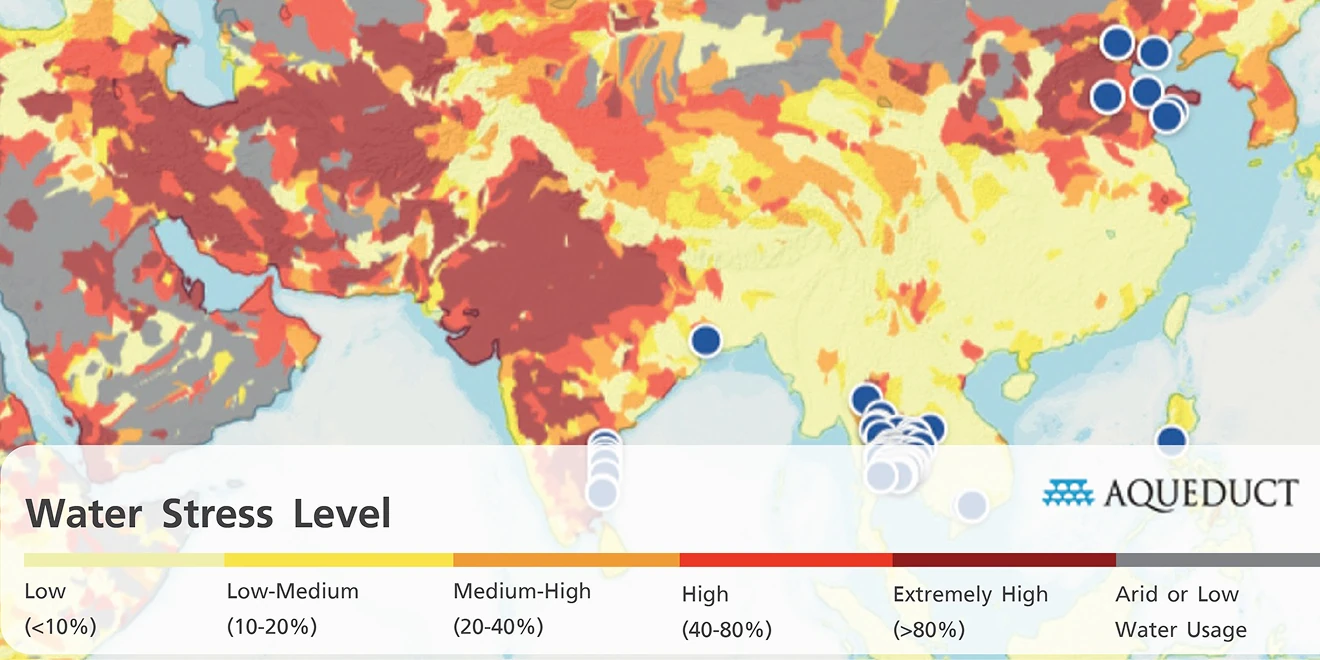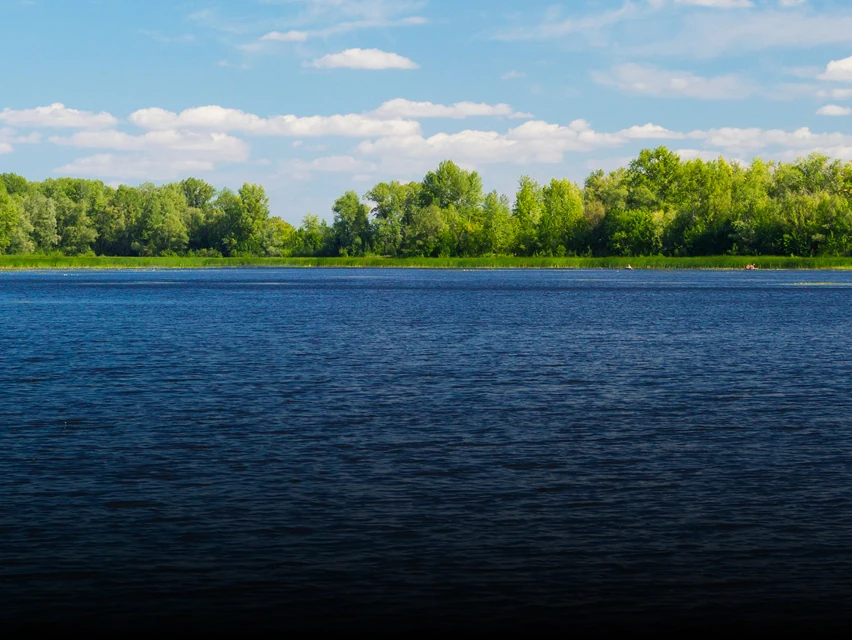Water Stewardship Management
Our priorities lie in reducing water consumption, increasing water reuse and recycling efficiency. We actively collaborate with local communities to promote responsible water use and long-term protection of water resources.
Goals and Progress
reduction of water withdrawal per unit of revenue compared to base year 2020
| Year | Goals |
|---|---|
| 2024 | 100% |
| 2023 | 100% |
| 2022 | 100% |
Supporting the SDGs

Stakeholders Directly Impacted
Key Performance 2024




Related Documents
Water Stewardship Management Approach
Charoen Pokphand Group’s water stewardship management approach is deeply rooted in the company's core values and corporate culture.
We prioritize responsible water management across their diverse business operations and supply chain. The approach begins with a thorough assessment of water-related risks and opportunities, setting clear objectives in line with global sustainability goals, and adhering to strict environmental standards to protect water quality. Water efficiency and conservation are top priorities for C.P. Group, as we invest in innovative technologies to minimize water consumption while maintaining high productivity levels. Collaboration with stakeholders, including local communities, governments, NGOs, and experts, is central to our approach. We actively engage in dialogue and partnerships to address water challenges collectively and co-create sustainable solutions.
Integrated Water Risk Assessment
Charoen Pokphand Group has developed a water risk assessment framework for implementation in all business groups.
The assessment considers various risk factors, including the water withdrawal volume of each business unit and baseline water stress using the widely recognized Aqueduct Water Risk Atlas tool established by the World Resources Institute (WRI). The assessment results are subsequently ranked according to the three levels of water risk in order to develop appropriate management plans.
Water Risk Assessment Framework
| Baseline Water Stress | Water Withdrawal | Water Risk |
|---|---|---|
| + Low – Medium Volume | Low Risk | |
| + High Volume | Medium Risk | |
| + Low Volume | Low Risk | |
| + Medium Volume | Medium Risk | |
| + High Volume | High Risk |
Water Management Plan
- Regularly monitor water withdrawals through reporting systems
- Improve water use efficiency using the "5Rs" principle
- Regularly monitor water withdrawals through reporting systems
- Improve water use efficiency using the "5Rs" principle
- Regularly monitor water withdrawals through reporting systems
- Assess local-level risks using the "Local Water Tool"
- Assess water risks for key suppliers
C.P. Group’s Production Units with Water Risk Level
As climate change accelerates and global water demand intensifies
Charoen Pokphand Group recognizes the critical need for resilient and efficient water management. We conduct regular risk assessments across our global operations to proactively identify and respond to emerging water challenges.
Operating sites worldwide
Recent assessments indicate that most of our operational areas remain at low risk, yet we prioritize those identified as high-risk by implementing localized water management plans. These include maximizing water reuse, improving process efficiency, and promoting a culture of responsible consumption across all facilities.
Beyond operational focus, the Group has expanded its approach to include nature-based risk assessments, integrating ecosystem health and biodiversity considerations using internationally recognized frameworks. This holistic strategy ensures that our water stewardship efforts are not only sustainable but also restorative for the environment over the long term.

Charoen Pokphand Group in collaboration with Keystone, initiated a pilot project to conduct a site-specific assessment of biodiversity-related risks and business opportunities using the TNFD LEAP approach. Water resources are identified as one of the key indicators in this assessment. The evaluation methodology and a brief summary of the results are as follows:

Locate
Evaluate
Assessing dependencies and impacts associated with each site. The evaluation found that poultry farms, swine farms and agricultural farms have very high dependency on water use to raise animals, causing freshwater habitat degradation due to water diversion and loss of species abundance. Meanwhile, water pollution was still found in the Bangladeshi poultry farm, leading to water quality decline.
Assess
Assessing risks of identified dependencies and establishing impact mitigation plans. In terms of dependency on water use for animal rearing, efforts to conserve and reduce water use in line with the Groups water reduction target have been carried out on sites with risks. With regards to alleviating the problem of water pollution, wastewater is treated via bioremediation on sites with risks.
Prepare
Defining targets consistent with applicable global biodiversity framework targets, including reducing water withdrawal per unit of revenue by 20% compared to baseline year 2020, adopting a policy of non-chemical pest control management on all directly owned farms where possible, and reducing pesticide risk by 50%.
Circular Water Management
Charoen Pokphand Group’s water stewardship is based on the principles of the CEO Water Mandate, which is an initiative of the UN Global Compact. In managing our internal water supply, the Group has adopted the Circular Water Management concept in accordance with the 5Rs principle (Reduce, Reuse, Recycle, Restore, and Recover)
established by the World Business Council for Sustainable Development (WBCSD). This is aimed at improving water-use efficiency through various measures and enabling water reuse or recycling. We also highlight an effective wastewater treatment process to ensure that the treated water quality meets, or is above, the required standard of each country prior to discharging into natural water resources.
Sustainability in Action
Managing Wastewater Prior to Discharge to Natural Water Bodies
Releasing untreated wastewater into natural water bodies will produce a range of negative impacts. Environmentally, it will harm creatures and plants in the water source. In terms of human health, it will become a source of pathogens and water pollution as well as destroy water sources for daily consumption.
Charoen Pokphand Group is well aware that business operations may affect the quality of water sources. Therefore, we are committed to wastewater management and ensuring that water quality meets standards before releasing it into natural water sources.
Sustainability in Action
Training on Water Stewardship
To comply with the guidelines of the Water Stewardship Policy, we regularly communicate with employees, suppliers, business partners, and stakeholders to raise awareness about the issue of water stewardship.
We have developed online educational materials including water efficiency management, water risk assessment, reducing water usage in operations, wastewater treatment, and assisting communities in accessing water resources. Additionally, we have conducted training courses on water management and water balance with the aim of reviewing accurate water management practices and developing guidelines for water reuse/recycling. These training sessions are provided to the recycled water quality management committee, farm/factory managers, and relevant employees.
Water Resources Data in 2024
Water Withdrawal
| Type | Water Resources |
|---|---|
| Freshwater | 63% |
| Other Water | 37% |
TDS (Total Dissolved Solids) = Amount of inorganic and organic substances dissolved in water
Water Discharge
| Type | Water Resources |
|---|---|
| Freshwater | 61% |
| Other Water | 39% |
TDS (Total Dissolved Solids) = Amount of inorganic and organic substances dissolved in water
Water Withdrawal by Source
Proportion of Water in Water Stressed Areas
* Units located in high and extremely high baseline water stress areas based on Aqueduct Water Risk Atlas
Unit: million cubic meters
Unit: million cubic meters
| Water in non water stressed areas |
Water in water stressed areas |
|
|---|---|---|
| Surface Water | 114 | 30 |
| Seawater | 102 | 7 |
| Groundwater | 37 | 52 |
| Third-party Water | 28 | 24 |
| Rainwater | 2 | 19 |
Water Discharge by Source
Proportion of Water in Water Stressed Areas
* Units located in high and extremely high baseline water stress areas based on Aqueduct Water Risk Atlas
Unit: million cubic meters
Unit: million cubic meters
| Water in non water stressed areas |
Water in water stressed areas |
|
|---|---|---|
| Surface Water | 30 | 33 |
| Seawater | 83 | 0 |
| External Usage | 12 | 4 |

Total Water Withdrawal
Total Water Discharge
Water Withdrawal from Water Stressed Areas
Water Recycled/Reused
Wastewater Quality - BOD (Biological Oxygen Demand)
CP Group’s average BOD is within the effluent discharge control standards of each country
Wastewater Quality - COD (Chemical Oxygen Demand)
CP Group’s average COD is within the effluent discharge control standards of each country














